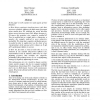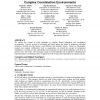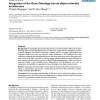96 search results - page 17 / 20 » The role of secondary attributes in formal object modelling |
128
click to vote
ATAL
2004
Springer
15 years 6 months ago
2004
Springer
In this paper we will examine two main aspects of trust dynamics: a) How direct experiences involving trust, with their successes or failures, influence the future trust of an age...
190
click to vote
POPL
2006
ACM
16 years 1 months ago
2006
ACM
Virtual classes are class-valued attributes of objects. Like virtual methods, virtual classes are defined in an object's class and may be redefined within subclasses. They re...
CHI
2005
ACM
16 years 1 months ago
2005
ACM
We explore the concept of social landmarks in complex, shared information and coordination environments. Previous research in navigation and shared spaces has tended to emphasize ...
104
click to vote
CORR
1999
Springer
15 years 26 days ago
1999
Springer
: There has been much discussion recently about the scope and limits of purely symbolic models of the mind and about the proper role of connectionism in cognitive modeling. This pa...
121
click to vote
BMCBI
2005
15 years 1 months ago
2005
Background: To standardize gene product descriptions, a formal vocabulary defined as the Gene Ontology (GO) has been developed. GO terms have been categorized into biological proc...



